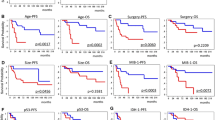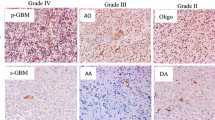Abstract
Surgical cure of gliomas infiltrating into the brain is practically impossible and their clinical course is primarily determined by the biological behavior of the tumor cell. The purpose of this study was to analyze retrospectively prognostic input of p53, Mouse double minute-2 (Mdm2) and p16 in 103 uniformly treated patients with astrocytic tumors. The expression of these molecules was measured by immunohistochemical procedure. Prognostic evaluation was performed with the multivariate proportional hazards model. The follow-up period lasted 19 (5–122) months for the survivors. We observed that 66% of gliomas showed mutated p53, while only 17% overexpressed Mdm2, the p53-regulatory molecule. Besides, almost 50% of gliomas lost p16 immunopositivity. Only p53 labeling showed a positive correlation with the grade of malignancy, according with the WHO classification. The association between mutated p53 and histological grade remained when prognostic variables were considered in a multivariate analysis. No association between p53 status and overall survival was found. On the other hand, Mdm2 overexpression and, unexpectedly, p16 immunopositivity were associated with a shorter survival in an univariate analysis. However, Cox-regression analysis showed that only Mdm2 in female patients was an independent prognostic factor, associated with shorter survival.
In conclusion, our results suggest that Mdm2 could be a relevant marker in determining the evolution of glioma patients and could provide a more objective way to classify astrocytomas.
Similar content being viewed by others
References
Kleihues P, Cavenee WK (eds): Pathology and Genetics of Tumours of the Nervous System. International Agency for Research on Cancer (IARC), Lyon, 2000
Zhu Y, Parada LF: The molecular and genetic basis of neurological tumours. Nat Rev Cancer 2(8): 616–626, 2002
Ware ML, Berger MS, Binder DK: Molecular biology of glioma tumorigenesis. Hist Histopathol 18(1): 207–216, 2003
Besson A, Yong VW: Mitogenic signaling and the relationship to cell cycle regulation in astrocytoma. J Neuro-Oncol 51(3): 245–264, 2001
Chakravarti AB, Delaney MA, Noll E, Black PM, Loeffler JS, Muzikansky A, Dyson NJ: Prognostic and pathologic significance of quantitative protein expression profiling in human gliomas. Clin Cancer Res 7(8): 2387–2395, 2001
Hollstein M, Rice K, Greenblatt MS, Soussi T, Fuchs R, Sorlie T, Hovig E, Smith-Sorensen B, Montesano R, Harris CC: Database of p53 gene somatic mutations in human tumors and cell lines. Nucleic Acids Res 22(17): 3551–3555, 1994
Meltzer PS: MDM-2 and p53: a question of balance. J Natl Cancer Inst 86(17): 1265–1266, 1994
Sherr CJ: Tumor surveillance via the ARF-p53 pathway. Genes Dev 12: 2984–2991, 1998
Lu W, Lin J, Chen J: Expression of p14ARF overcomes tumor resistance to p53. Cancer Res 62(5): 1305–1310, 2002
Kondo S, Kondo Y, Hara H, Kaakaji R, Peterson JW, Morimura T, Takeuchi J, Barnett GH: Mdm2 gene mediates the expression of mdr1 gene and P-glycoprotein in a human glioblastoma cell line. Br J Cancer 74(8): 1263–1268, 1996
Shapiro G, Edwards CD, Rollins BJ: The physiology of p16 (INK4A)-mediated G1 proliferative arrest. Cell Biochem Biophys 33(2): 189–197, 2000
Bortolotto S, Chiadó-Piat L, Cavalla P, Bosone I, Chio A, Mauro A, Schiffer D: CDKN2A/p16 inactivation in the prognosis of oligodendrogliomas. Int J Cancer 88(4): 554–557, 2000
Xiao ZX, Chen J, Levine AJ, Madjtahedi N, Xing J, Sellers WR, Livingston DM: Interaction between the retinoblastoma protein and the oncoprotein MDM2. Nature 375(6533): 694–698, 1995
Vousden KH: p53: death star. Cell 103(5): 691–694, 2000
Finlay CA, Hinds PW, Levine AJ: The p53 protooncogene can act as a suppressor of transformation. Cell 57(7): 1083–1093, 1989
Louis DN, Gusella JF: A tiger behind many doors: multiple genetic pathways to malignant glioma. Trends Genet 11(10): 412–415, 1995
von Deimling A, von Ammon K, Schoenfeld D, Wiestler OD, Seizinger BR, Louis DN: Subsets of glioblastoma multiforme defined by molecular genetic analysis. Brain Pathol 3(1): 19–26, 1993
Watanabe K, Tachibana O, Sata K, Yonekawa Y, Kleihues P, Ohgaki H: Overexpression of the EGF receptor and p53 mutations are mutually exclusive in the evolution of primary and secondary glioblastomas. Brain Pathol 6(3): 217–223, 1996
Calogero A, Arcella A, De Gregorio G, Porcellini A, Mercola D, Liu C, Lombari V, Zani M, Giannini G, Gagliardi F, Caruso R, Gulino A, Frati L, Ragona G: The early growth response gene EGR-1 behaves as a suppressor gene that is down-regulated independent of ARF/Mdm2 but not p53 alterations in fresh human gliomas. Clin Cancer Res 7(9): 2788–2796, 2001
Fulci G, Labuhn M, Maier D, Lachat Y, Hausmann O, Hegi ME, Janzer RC, Merlo A, Van Meir EG: p53 gene mutation and ink4a-arf deletion appear to be two mutually exclusive events in human glioblastoma. Oncogene 19(33): 3816–3822, 2000
Rainov NG, Dobberstein KU, Bahn H, Holzhausen HW, Lautenschläger C, Heidecke V, Burkert W: Prognostic factors in malignant glioma: influence of the overexpression of oncogene and tumor-suppressor gene products on survival. J Neuro-Oncol 35(1): 13–28, 1997
Ng HK, Lo SY, Huang DP, Poon WS: Paraffin section p53 protein immunohistochemistry in neuroectodermal tumors. Pathology 26(1): 1–5, 1994
Barbareschi M, Iuzzolino P, Pennella A, Allegranza A, Arrigoni G, Dalla Palma P, Doglioni C: p53 protein expression in central nervous system neoplasms. J Clin Pathol 45(7): 583–586, 1992
Korkolopoulou P, Christodoulou P, Kouzelis K, Hadjiyannakis M, Priftis A, Stamoulis G, Seretis A, Thomas-Tsagli E: Mdm2 and p53 expression in gliomas: a multivariate survival analysis including proliferation markers and epidermal growth factor receptor. Br J Cancer 75(9): 1269–1278, 1997
Shiraishi S, Tada K, Nakamura H, Makino K, Kochi M, Saya H, Kuratsu J, Ushio Y: Influence of p53 mutations on prognosis of patients with glioblastoma. Cancer 95(2): 249–257, 2002
Biernat W, Kleihues P, Yonekawa Y, Ohgaki H: Amplification and overexpression of MDM2 in primary (de novo) glioblastoma. J Neuropathol Exp Neurol 56(2): 180–185, 1997
Schiebe M, Ohneseit P, Hoffmann W, Meyermann R, Rodemann HP, Bamberg M: Analysis of mdm2 and p53 gene alterations in glioblastomas and its correlation with clinical factors. J Neuro-Oncol 49(3): 197–203, 2000
Smith JS, Jenkins RB: Genetic alterations in adult diffuse glioma: occurrence, significance and prognostic implications. Front Biosci 5: D213–231, 2000
Schroeder R, Feisel KD, Ernestus RI: Ki-67 labeling is correlated with the time to recurrence in primary glioblastomas. J Neuro-Oncol 56(2): 127–132, 2002
Phuphanich S, Ferrall S, Greenberg H: Long-term survival in malignant glioma. Prognostic factors. J Fla Med Assoc 80(3): 181–184, 1993
Sant M, van der Sanden G, Capocaccia R: Survival rates for primary malignant brain tumours in Europe. Eur J Cancer 34(14): 2241–2247, 1998
Korshunov A, Golanov A, Sycheva R: Immunohistochemical markers for prognosis of oligodendroglial neoplasms. J Neuro-Oncol 58(3): 217–236, 2002
Soini Y, Niemela A, Kamel D, Herva R, Bloigu R, Paakko P, Vahakangas K: p53 immunohistochemical positivity as a prognostic marker in intracranial tumours. APMIS 102(10): 786–792, 1994
Danks RA, Chopra G, Gonzales M, Orian JM, Kaye AH: Aberrant p53 expression does not correlate with the prognosis in anaplastic astrocytoma. Neurosurgery 37(2): 246–254, 1995
Al-Sarraj S, Bridges LR: Immunoreactivity in astrocytoma and its relationship to survival. Br J Neurosurg 9(2): 143–149, 1995
Kamiryo T, Tada K, Shiraishi S, Shinojima N, Nakamura H, Kochi M, Kuratsu J, Sava H, Ushio Y: Analysis of homozygous deletion of the p16 gene and correlation with survival in patients with glioblastoma multiforme. J Neurosurg 96(5): 815–822, 2002
Kirla R, Salminen E, Huhtala S, Nuutinen J, Talve L, Haapasalo H, Kalim H: Prognostic value of the expression of tumor suppressor genes p53, p21, p16 and prb, and Ki67 labeling in high grade astrocytomas treated with radiotherapy. J Neuro-Oncol 46(1): 71–80, 2000
Shono T, Tofilon P, Schaefer T, Parikh D, Liu T, Lang F: Apoptosis induced by adenovirus-mediated p53 gene transfer in human glioma correlates with site-specific phosphorylation. Cancer Res 62(4): 1069–1076, 2002
Wang TJ, Huang MS, Hong CY, Tse V, Silverberg G, Hsiao M: Comparisons of tumor suppressor p53, p21 and p16 gene therapy effects on glioblastoma tumorigenicity in situ. Biochem Biophys Res Commun 287(1): 173–180, 2001
Author information
Authors and Affiliations
Rights and permissions
About this article
Cite this article
Ranuncolo, S.M., Varela, M., Morandi, A. et al. Prognostic Value of Mdm2, p53 and p16 in Patients with Astrocytomas. J Neurooncol 68, 113–121 (2004). https://doi.org/10.1023/B:NEON.0000027741.19213.99
Issue Date:
DOI: https://doi.org/10.1023/B:NEON.0000027741.19213.99




